Last Updated: 1 month ago
As a caring cat owner, knowing the things cats can’t eat helps keep them healthy and avoid any adverse or health-threatening issues.
We eat many types of foods, and you may be tempted to give your feline friend some of your food.
Or, they may come across plants and other items in your backyard and mistake them for food.
Please keep reading to find out what cats can’t eat and why you should keep these foods away from them.
Human Foods Cats Can’t Eat
Let’s start with human foods, because these are the things that your cat is most likely to accidentally eat (or that you may even give on purpose with the best intentions).
Dairy Products
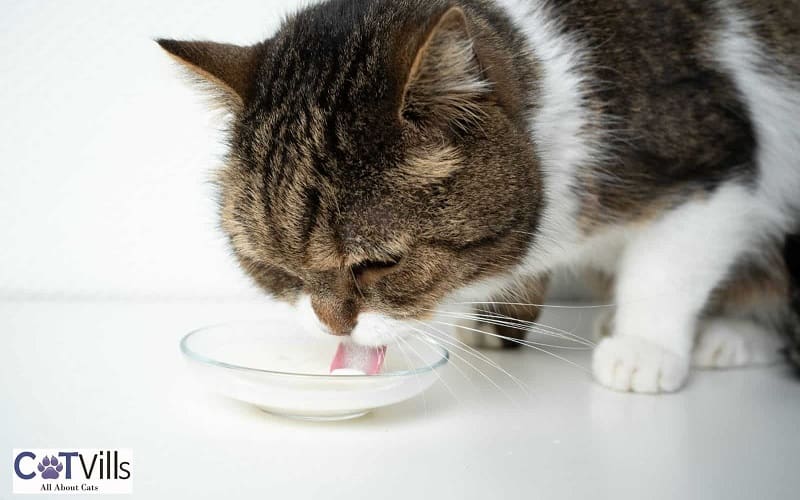
For as long as I can remember, I used to see my mom feed milk to our cats. And they appeared to love it too.
So, I was surprised to learn later that milk, cream, cheese, and other dairy products can be harmful to cats.
Like most mammals, cats are lactose intolerant. Mammals can digest lactose during the breastfeeding period, but as they grow up, they develop lactose intolerance, and their digestive systems become more inclined toward solid food.
So, feeding your cat too many dairy products could lead to vomiting, diarrhea, and digestive issues until the lactose is cleared from their system.
Dairy products such as ice cream also contain high sugar content, leading to stomach upset, diarrhea, and obesity.
Bear in mind that cats are not allergic to dairy products. They are just intolerant of the lactose in milk. Sometimes, dairy products can serve as treats.
Chocolate, Coffee, Tea

Chocolate, tea, and coffee contain methylxanthines that are harmful to cats.
The most common methylxanthines found in these foods are caffeine and theobromine, but there are many other types.
These compounds cause seizures, heart palpitations, heart failure, panting, vomiting, diarrhea, and death.
Dark chocolate contains more methylxanthines, making it more toxic to pets compared to white chocolate.
Raw Eggs or Meat
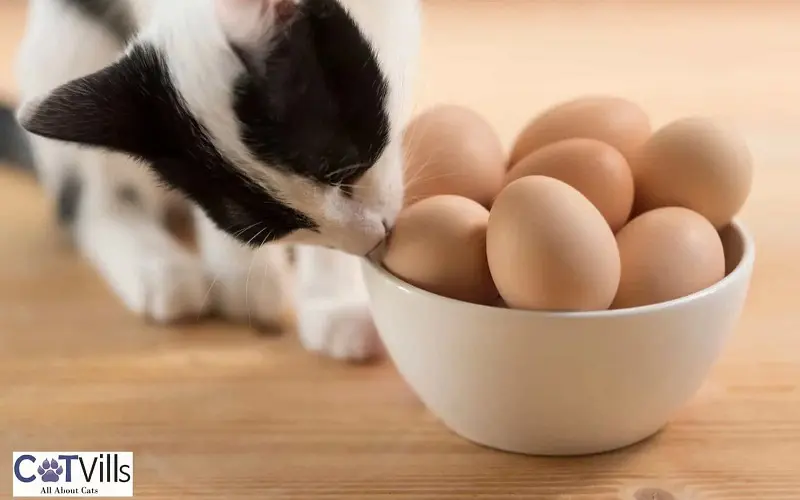
Eggs are an excellent source of protein for cats, but only when they’re cooked.
Feeding cats raw eggs, raw meat, or bones may seem normal since they feed on raw food while in the world, but it’s dangerous.
Raw meat and eggs contain bacteria such as E. Coli and Salmonella that can cause a wide range of health, including food poisoning, fever, diarrhea, and vomit.
What’s worse is that they can spread these bacteria to items that people use, exposing them to similar health issues as you’ll observe in cats.
Avidin, a protein present in raw egg whites, though in small amounts, can inhibit the intake of a Vitamin B known as Biotin. A deficiency in Biotin can lead to skin issues.
On the other hand, raw fish contains thiaminase, an enzyme that destroys thiamine. A thiamine deficiency could lead to convulsions, coma, and neurological disorders.
Fat Trimmings and Bones

Domestic cats are not used to devouring bones like their wild cousins. So, feeding them raw bones could lead to choking or sores and splinters in their mouths and digestive systems.
On the other hand, while some cats love fat trimmings, their digestive systems are not well-equipped to break them down, causing stomach upsets, diarrhea, and vomiting.
Tuna
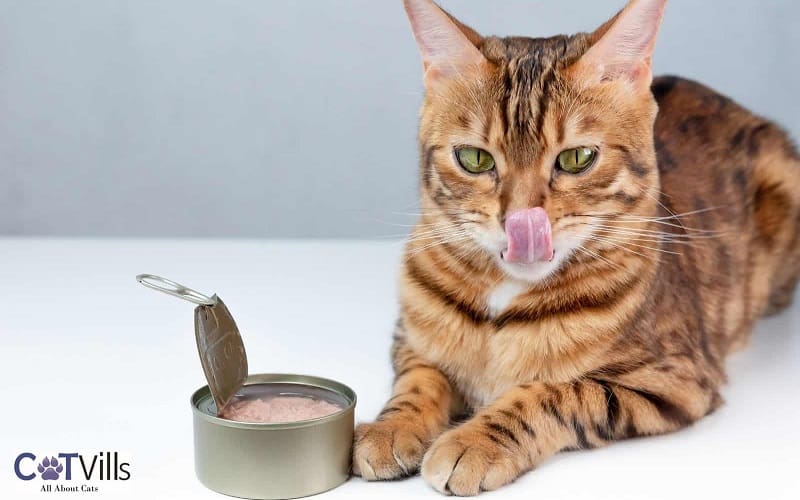
Canned tuna can be fed occasionally as a treat, but it has no nutritional value for cats. Feeding cats tuna regularly could lead to malnutrition or obesity.
Why?
Tuna contains a high fat content and excess calories. For instance, a can of tuna contains at least 100 calories, and an adult cat should eat at least 290 calories.
As you can see, tuna will account for almost a third of the calories a cat needs, but that will not be a balanced diet since it does not provide the essential nutrients.
Excess tuna in a cat’s diet can also lead to mercury poisoning, which is accompanied by symptoms such as poor balance and dizziness. Also, raw tuna can contain harmful bacteria.
Liver
You may feed your cat small amounts of liver since it has beneficial amounts of vitamin A.
But too much liver leads to vitamin A toxicity, a health condition accompanied by bone deformities, poor bone growth, osteoporosis, and death.
Yeast Bread
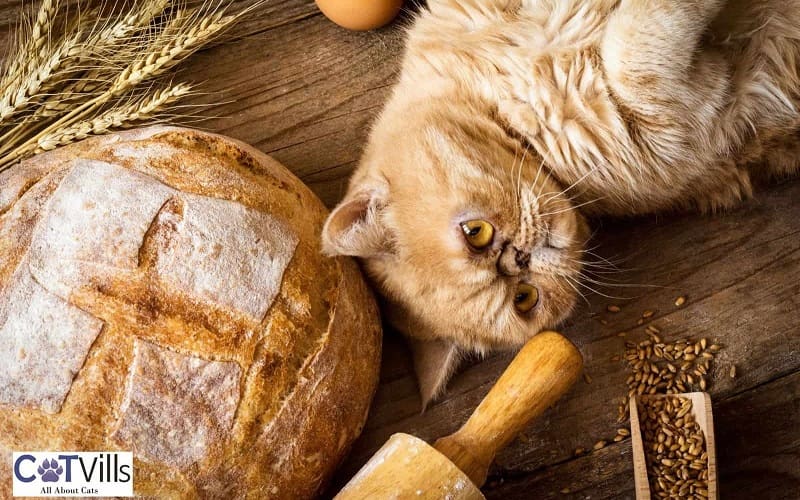
While well-prepared bread may not be toxic to cats, it barely has any nutritional value for cats. It’s best to avoid it entirely.
Yeast dough, on the other hand, is very dangerous. Yeast expands in a warm environment.
So, when the dough gets to the cat’s stomach, it starts expanding, causing stomach aches, bloating, twisting, discomfort, and even death.
Yeast can also produce alcohol, which has other health implications, as I’m going to discuss below.
Alcohol
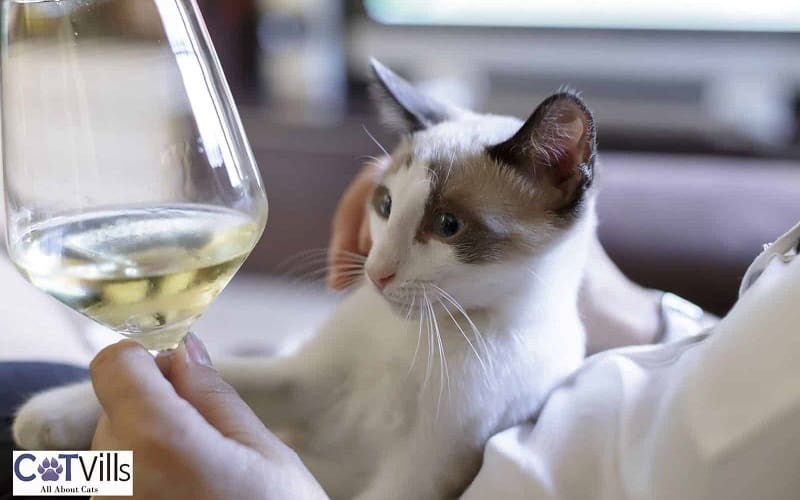
Alcohol is one of the worst and most unhealthy beverages you can ever feed your cat.
These aren’t the beverages you say you can offer as a treat since even a tablespoon of alcohol can be fatal.
Alcohol causes almost the same effects in cats as it does in humans.
But sometimes, it tends to be worse in cats, especially when the drink or food has a high alcohol concentration.
Some of the symptoms of alcohol consumption in cats include:
- Poor balance and coordination
- Lethargy
- Vomiting
- Troubled breathing
- Liver and kidney damage
- Drowsiness
Onions, Garlic, Chives
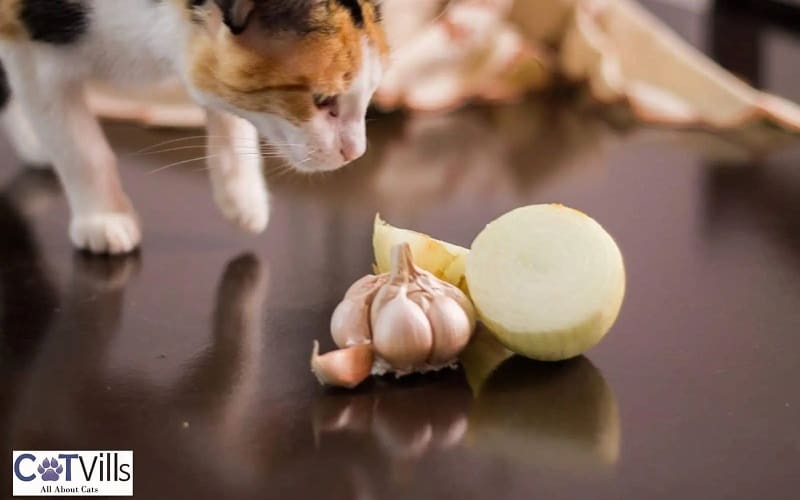
Feeding cats with foods containing any of these herbs, or even feeding them raw, is very dangerous.
Onions, garlic, chives, and other similar herbs in the onion family or the allium family are highly toxic and could cause blood cell damage.
As a result, the cat’s blood circulation system can’t transport blood as expected, causing anemia and other gastrointestinal issues.
Citrus Fruits
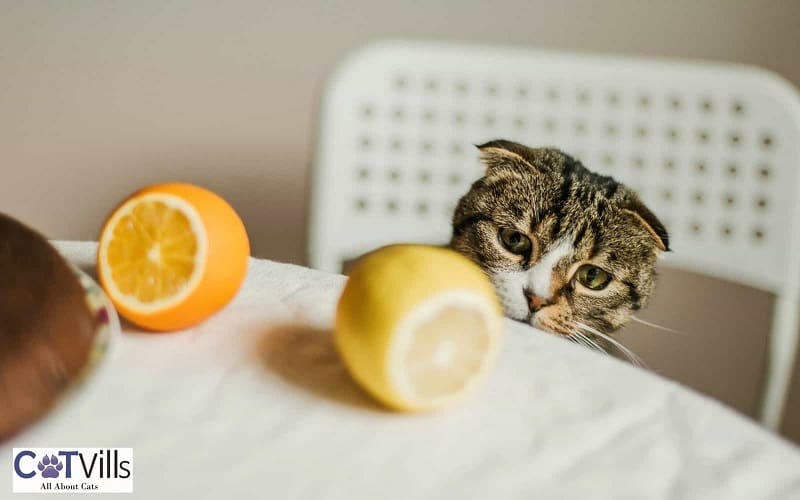
Oranges, lemons, clementines, and other citrus fruits are toxic to cats.
They contain essential oils, citric acid, and other harmful elements that may cause an upset stomach, diarrhea, vomiting, trembling, drooling, or even damage the central nervous system.
The peels, seeds, stems, and leaves aren’t safe either and should be avoided.
Grapes and Raisins
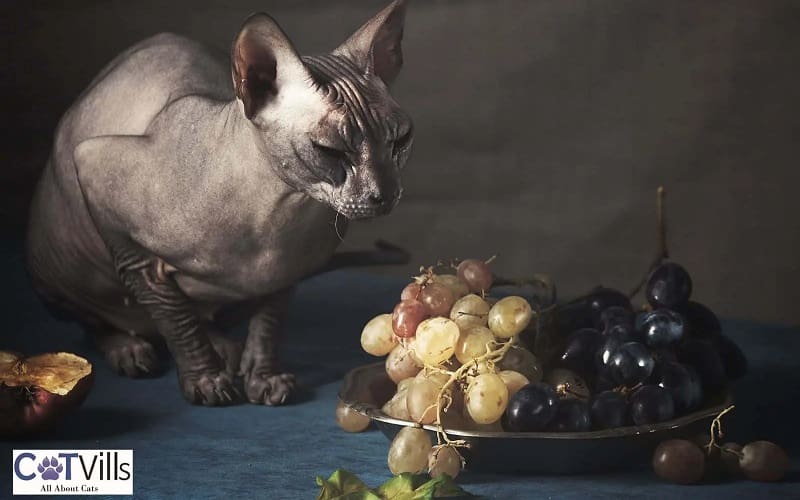
Not much is known about the toxicity of grapes or raisins (dried grapes) to cats. But some cats have experienced kidney failure, and others fell ill after eating these fruits.
Other symptoms cats may experience include;
- Lethargy
- Abdominal pain
- Loss of appetite
- Dehydration
- Increased thirst
Even though not all cats are affected after eating grapes, it’s still not advisable to feed them. It’s also not known how many grapes a cat would have to eat before the cat experiences any symptoms.
Coconut
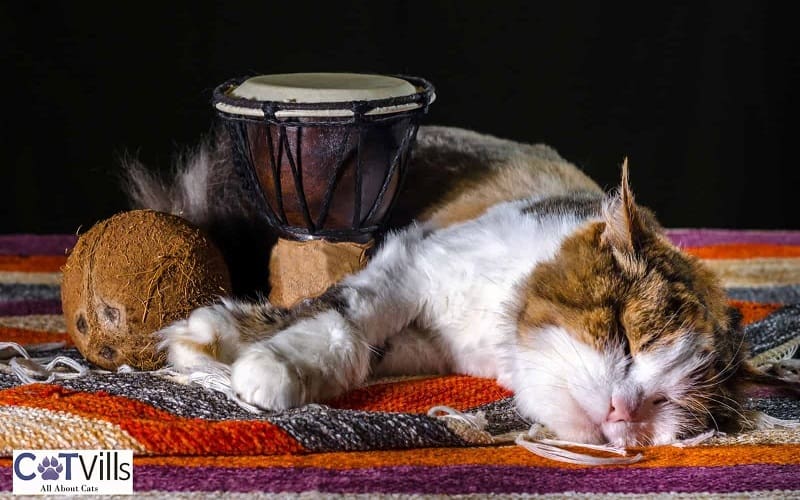
Coconut can be fed in small amounts as an occasional treat, but too much of it can be dangerous to cats. For instance, coconut flesh and coconut oils contain too much fat.
When you feed your cat regularly, this fat builds up, leading to obesity and other liver and heart issues associated with obesity.
How about coconut milk? It may not be as harmful as cow milk, but coconut milk still contains too much fat and calories, which aren’t good for cats.
Coconut water isn’t safe either since it contains too much potassium. Excess potassium can cause spasms, lethargy, constipation, and weakness in cats.
Macadamia Nuts
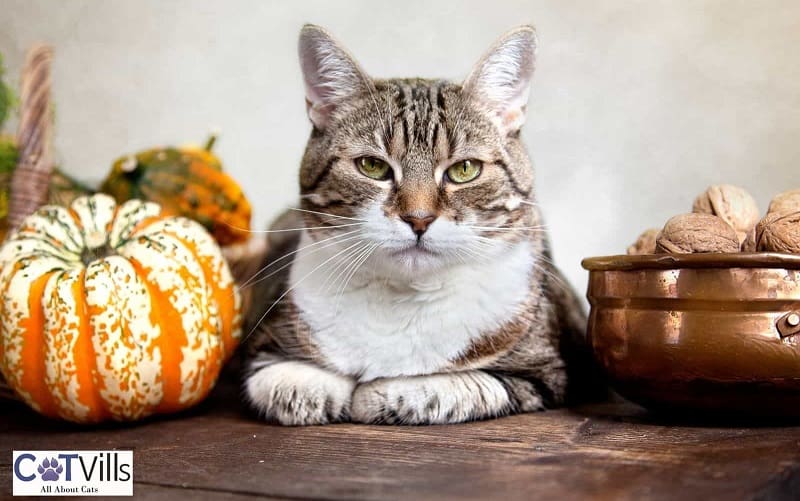
Macadamia nuts are known to cause lethargy, hypothermia, tremors, vomiting, and damage to the nervous system in dogs.
While it’s not clear whether they would have the same effects on cats, it’s better to be safe than sorry.
Your cats may get away if they accidentally eat a few nuts, but too many of them could cause adverse effects.
What we know is that macadamia nuts have a lot of fat, which could lead to obesity and other weight-related issues.
Other nuts that cats shouldn’t eat due to their fat content and potential toxicity include:
- Almonds
- Walnuts
- Pecans
How about peanuts? Is peanut safe for cats? Unlike the other nuts mentioned, peanuts aren’t toxic to cats.
They are a good source of proteins, which cats need in their daily diet. However, you should only feed them occasionally due to the high fat content.
Xylitol
Xylitol is a common sweetener in toothpaste, candy, baked goods, and other sugary foods.
While sugar can give some brief bursts of energy, Xylitol is not safe for cats since it could trigger insulin release, leading to a drop in blood sugar and liver damage.
Other symptoms include lethargy, vomiting, poor balance and coordination, and seizures.
Avocado
Avocados are bad news for most pets, including cats, dogs, horses, and rabbits.
While they have some incredible health benefits, avocados also contain persin, a toxic substance known to cause vomiting, constipation, diarrhea, and even pancreatitis.
Persin is more concentrated in the seeds, leaves, and peels, but I would still avoid feeding the pulp to cats.
Fruits
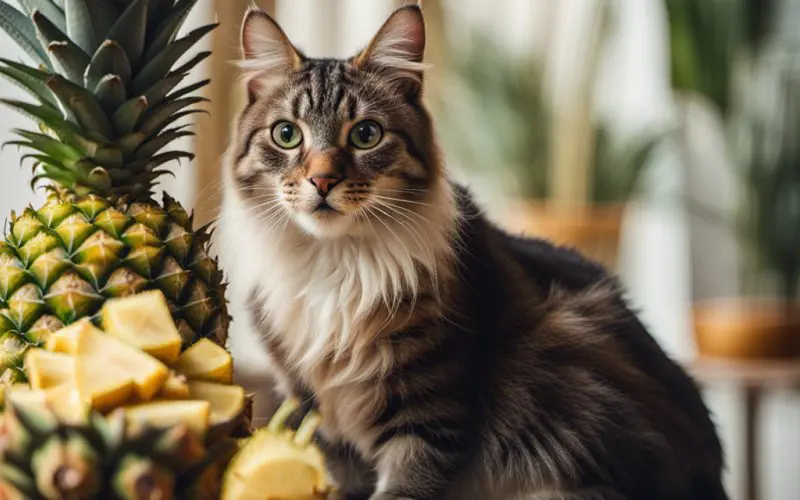
While small amounts of fruits may seem like a healthy treat for cats, fruits have too much sugar content that’s harmful to cats.
Some of the fruits to avoid include:
- Pineapples
- Peach
- Raspberries
- Watermelons
Salty Foods
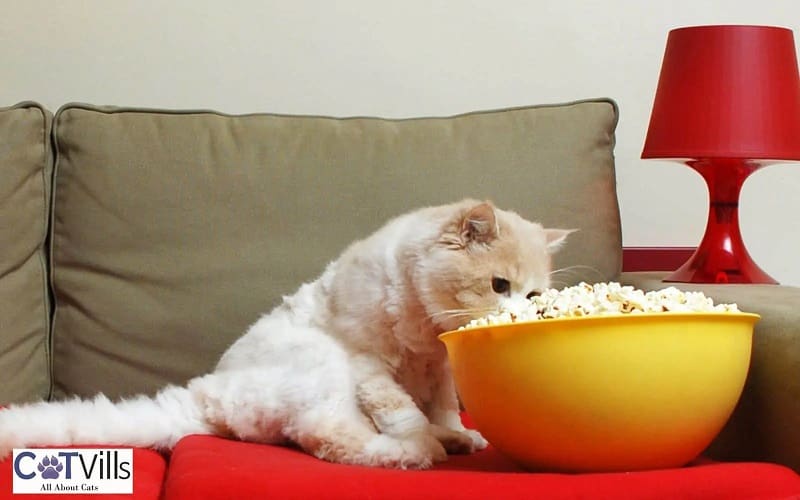
Salt or snacks with too much salt, such as pretzels, chips, popcorn, etc., are also harmful to cats.
How so? Excess salt induces thirst, excessive urination, and sodium poisoning.
Too much salt can also cause vomiting, diarrhea, high body temperature, depression, tremors, seizures, and death.
Other Things Cats Can’t Eat
Besides people’s food, below are other foods you shouldn’t feed your cat.
Dog Food
Dog food and cat food may seem to have the same ingredients, but they don’t. Cats and dogs have different nutritional needs.
So, feeding them too much dog food could lead to malnutrition and mineral deficiencies. Taurine is one of the most crucial nutrients that should be in a cat’s diet.
Without it, cats could experience heart disease, lethargy, dental issues, and other health issues. If you’re wondering, why do cats eat litter?
The lack of essential nutrients like taurine in their food is one of the reasons. You can feed your cats dog food from time to time, and some cats even seem to like it, but don’t replace cat food with dog food.
Human Medicine
You may have noticed your cats experiencing a headache or any other conditions that people experience and thought of giving them your medicine. That’s a bad idea.
While the medicine may treat your illness, it will most likely be toxic to cats. Unless advised by your vet, keep all medicines where your cats can’t reach them.
Plants And Household Items
- Plants such as Daffodils, Hyacinths, Aloe Plants, Tulips, Monstera, and Azaleas.
- Household items such as toys, decorations, dental floss, glowsticks, jewelry.
- Chemicals such as bleach, fertilizers, rodent baits, batteries, de-icing salts, flea medication, and antifreeze.
You may be wondering how on earth a cat can eat all this stuff. But cats are curious, and they may accidentally feed on harmful items because they are attractive or have a nice taste.
Conclusion
Although cats are known to restrain themselves from eating anything they find, they can still be attracted to toxic foods and other items.
And as we’ve established, some pet owners may feed their cats human food while assuming it is safe for them.
I hope this post clears up everything about what cats can’t eat. A normal cat food diet should contain a well-balanced combination of wet food and dry food, depending on their health requirements.
What things cats can’t eat have you accidentally fed your kitty? Let us know in the comments below
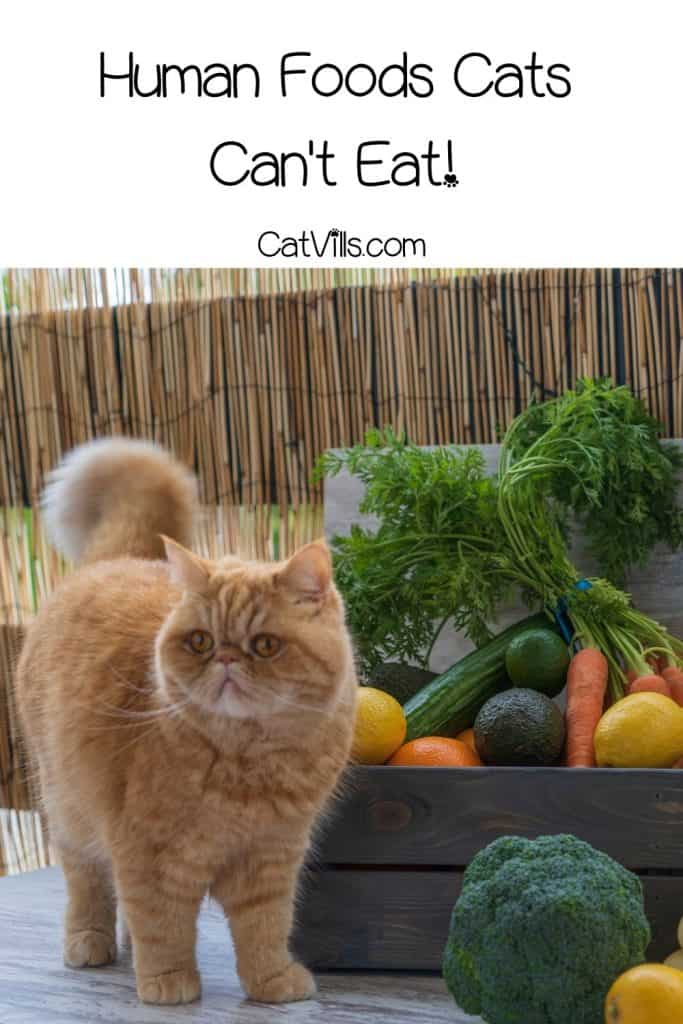

Dr. Linda Simon MVB MRCVS is a locum veterinary surgeon who has worked in London for the past 8 years. She graduated top of her class in small animal medicine from UCD, Dublin. She is currently a member of the Royal College of Veterinary Surgeons. Linda is the resident vet for Woman magazine and a frequent contributor to People’s Friend Magazine, the Dogzone website, Vet Help Direct and Wag! Linda also writes content for the CVS veterinary group, Vetwriter and a number of other establishments.
